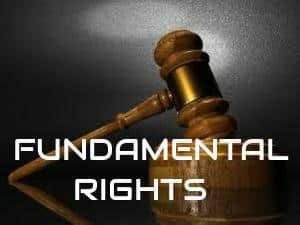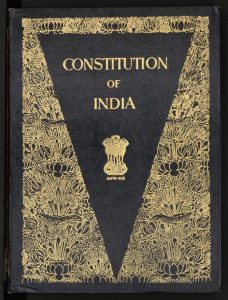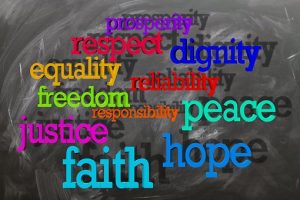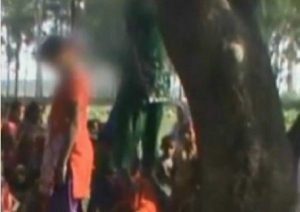Article 15: THE FUNDAMENTAL RIGHT
Right to equality Article(14-18) seems most important in the Indian context. After all, it’s a major part of Fundamental Rights, Part 3 of the Indian constitution. And it includes equality before the law, the prohibition
of discrimination on grounds of religion, race, caste, gender or place of birth. And equality of opportunity in matters of employment, the abolition of titles.

What is Article 15?
Prohibition of discrimination on grounds of religion, race, caste, sex or place of birth.—
(1) The State shall not discriminate against any citizen on grounds only of religion, race, caste, sex, place of birth or any of them.
(2) No citizen shall, on grounds only of religion, race, caste, sex, place of birth or any of them, be subject to any disability, liability, restriction or condition with regard to—
(a) access to shops, public restaurants, hotels and places of public entertainment;
(b) the use of wells, tanks, bathing ghats, roads and places of public resort maintained wholly or
partly out of State funds or dedicated to the use of the general public.
(3) Nothing in this article shall prevent the State from making any special provision for women
and children.
(4) Nothing shall prevent the State from making any special provision for the advancement of any socially and educationally backward classes of citizens or for the Scheduled Castes and the Scheduled Tribes.
(5) Nothing shall prevent the State from making any special provision, by law, for the advancement of any socially and educationally backward classes of citizens or for the Scheduled Castes or the Scheduled Tribes in so far as such special provisions relate to their admission to educational institutions including private educational institutions, whether aided or unaided by the State, other than the minority educational institutions.

Article 15 provides that the state shall not discriminate against any citizen on grounds only of religion, race, caste, sex or place of birth. The two crucial words in this provision are discrimination and only. The word discrimination means to distinguish unfavourably from others. The use of the word only connotes that discrimination on other grounds is not prohibited. However, there is a creamy layer which excludes people holding government posts, who are professionals, owing to large lands or engaged in business from the assigned benefits for this group of people. So basically Article 15 is for those who are from SCs, STs, and OBCs along with the poor or middle class. This article is like the pivot of the whole nation’s existence.

‘Anekta Main Ekta’, Unity in diversity, the tagline has never been known if there would not be Article 15.
The history that recalls the struggle for equality
Everyone has the right to be treated equally in this country. No one shall be arbitrarily deprived of his equality nor should be questioned or treated differently because of his/her caste.
With the efforts of Mahatma Gandhi, Dr B.R. Ambedkar joined the Congress in spite of having differences with its leaders. There are many incidents where Gandhiji opposed untouchability. He used to perform all those talks which were considered taboo for touchable.
For instance, he used to clean toilets of Ashram and made his followers including his wife Kasturba also to do the same. Also, he called the untouchables as Harijans or the children of God. He observed numerous fasts and satyagraha in order to secure the rights of Harijans. Gandhiji’s fast unto death in Yervada jail was all dedicated to the rights of untouchables. Moreover, he called himself a Harijan too.

It has been 3000 years since the caste system established Hinduism hierarchy in India and 69 years since it was outlawed. Yet, the cases of cruelty in the name of religion, caste, and race covers the headlines of breaking news every year. And if you are thinking that Article 15 has at least now been restored to its viability. I would like to show you the real
picture through this article.
In the Indian province of Rajasthan between the years 1999-2002, crimes against Dalits average at about 5024 a year, with 46 killings and 138 cases of rape. 1981, Phoolan Devi case, Uttar Pradesh, 1997, Ramabai killings, Mumbai and 1999, Bant Singh case, Punjab have been the direst cases of that time in concern of discrimination.
And above is the link of the most controversial brutality has ever done in the name of casteism. On 27 May 2014, alleged gang rape and murder of two teenage girls were reported in the Katra village of Budaun district, Uttar Pradesh, India. And it was very recent ie in May 2019, Dr Payal Tadvi, a 26-year-old oppressed caste Muslim gynaecologist died by committing suicide in Mumbai where she was being harassed by three “upper” caste women doctors.
The change it seeks
The historical day 26 Nov. 1949, recalls the adoption and 26th January 1950 for the implementation of the World’s largest written yet borrowed constitution. This elephant size document took 2 years 11 months and 18 days to be made which contained a preamble, 395 articles, and 8 schedules and then further 103 amendments have been added to it.
However, there are many such articles which have been ignored in terms of their regulation and implementation for a reason that the people still live in the past and they either are not aware or they just don’t want to be aware of the fact that there’s a thing called constitution by which each and every citizen of INDIA abides.
Another reason behind them being so laidback towards the law could be the fact that the constitution needs changes big time as we know its almost 70 years old and there are things that shall be changed with time some of them are done through amendments but some are yet to be made, but along with the constitution even we should be growing as a human being.
In INDIA nothing impacts people more than cinema. Bollywood alone deals with the society’s inner tension, its fault lines and frictions. And so the IDEA of what caste system is doing to the society is coming up with the film ‘Article 15’
The trailer drew favourable reactions of the film, with viewers calling it gripping and hard-hitting. Viewers also appreciated the makers for the choice of subject. Around 10 million people have viewed the trailer in just three days. The trailer starts with the definition of Article 15. And ends on the tagline “Bahot fark kar liya, Ab farak layenge”.

The film is inspired by the true events of the ‘infamous’ 2014 Badaun gang rape. In the film, three sisters working on daily wages are harassed for demanding hike of mere three rupees in their respective payments because they are Dalits.
As a result, the two were brutally gang-raped, murdered and hanged to set an example for the others. Ayushmann is seen searching for one of the three sisters. During the course of his investigations, Ayushmann unravels a system which is largely divided by the cast. With a gripping storyline, intriguing narration, stunning performances by actors and some hard-hitting dialogues, the trailer of the film will provoke you to want to see the film.
‘Article 15’ is all set to hit the theatres on June 28, 2019.




